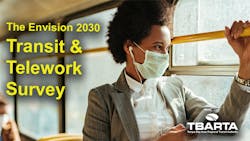A recent Tampa Bay Area Regional Transit Authority (TBARTA) Transit & Telework Survey found residents want increased investment in regional transit and see TBARTA as a valuable contributor to addressing the regional transit needs of local government.
When asked if the Tampa Bay region would benefit from increased regional transit, regardless of the mode of transportation, 82 percent agreed or strongly agreed. By comparison, eight percent disagreed or strongly disagreed. TBARTA says the results are not surprising, as 65 percent rated Tampa Bay’s public transit systems as below or well below average.
Support for TBARTA was also favorable. When asked how important it is for Florida to provide dedicated budget support to TBARTA in its work to expand regional transit across Tampa Bay, 74 percent said funding of TBARTA was either extremely important or very important.
“TBARTA does not operate independently, we are a partner to county and city governments, metropolitan planning organizations, transit agencies and Florida’s Department of Transportation,” said David Green, TBARTA executive director. “Our mission is to help local leaders address their needs and develop new regional transit solutions to help solve local problems. Regional transit plays a key role in economic prosperity across the country, and there is a great opportunity for the same in Tampa Bay.”
Survey respondents also see a strong connection between regional transit and economic prosperity, with 84 percent either agreeing or strongly agreeing when asked if increased regional transit would provide new opportunity for workers by making more jobs more accessible. Eighty percent either agreed or strongly agreed that new regional transit in Tampa Bay would benefit employers by increasing access to more employees.
Other topics included questions on telework and transit. A strong majority of employers and employees found telework that was brought on by the COVID-19 pandemic to be more productive than expected. As a result, future telework policies are expected to change. After the pandemic, 60 percent of employers say they will offer more telework opportunities than they did prior to the health crisis. Many employees agree, as 53 percent said they expect to have more telework opportunities than they did pre-COVID-19.
“The COVID-19 pandemic drastically altered our work routines and transportation habits, and we’re just beginning to understand how that will impact the years ahead,” Green said. “The Transit & Telework Survey was undertaken as a first-step to measure potential changes to the way Tampa Bay moves and works, as well as the role TBARTA can play in developing regional transit to better connect people and places.”
The 35-question survey was distributed across TBARTA’s five-county region during the first three months of the year, with 549 responses. Most of the respondents, 58 percent, live in Hillsborough County, with 22 percent in Pinellas, nine percent in Pasco, four percent in Manatee and two percent in Hernando. Complete survey results are posted on TBARTA’s website.


